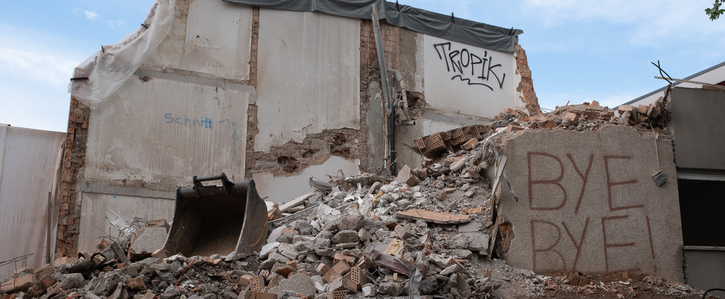10 Unterschriften erreicht
An: Parliament and Federal Council
Stop the Swiss Demolition - Sustainable Construction Now!

We, the architects of Countdown 2030 and all the signatories, call on the Swiss Parliament and the Federal Council to stop the unquestioned demolition of buildings and the massive waste of resources and energy in today’s construction!
We demand:
1. Demolition as an exception: A permit requirement for demolition ensures that every demolition is preceded by a careful examination by owners, developers and authorities. Where demolition is unavoidable, ambitious requirements for deconstruction and recycling should be imposed so that less waste is produced and as many components and building materials as possible are reused and recycled.
2. Stop disincentives: Tax deductions and measures that encourage demolition must be removed immediately. The disposal of building materials and debris must be made more expensive so that reuse, repair and recycling become economically more attractive than disposal.
3. Building in stock: A paradigm shift is needed with a focus on building in and upon existing buildings. Renovations, conversions, changes of use and structural extensions such as additions and additional floors should be privileged over new buildings so that they become more attractive.
4. Targets for all construction: Closed-loop recycling, resource efficiency, low land consumption, net-zero greenhouse gas emissions during construction, operation, maintenance and deconstruction are binding requirements for future construction. In the case of replacement buildings, it must also be ensured that the new building creates significant added value compared to the existing building and is in the public interest.
5. The public sector leads the way: the Confederation, cantons and communes set an example in all public building and civil engineering projects and demonstrate how sustainable building is achieved. In concrete terms, this means: 1. preserving buildings and avoiding demolition; 2. renovating and converting; 3. building on and adding to buildings; 4. circular construction with net zero in construction and operation.
We demand:
1. Demolition as an exception: A permit requirement for demolition ensures that every demolition is preceded by a careful examination by owners, developers and authorities. Where demolition is unavoidable, ambitious requirements for deconstruction and recycling should be imposed so that less waste is produced and as many components and building materials as possible are reused and recycled.
2. Stop disincentives: Tax deductions and measures that encourage demolition must be removed immediately. The disposal of building materials and debris must be made more expensive so that reuse, repair and recycling become economically more attractive than disposal.
3. Building in stock: A paradigm shift is needed with a focus on building in and upon existing buildings. Renovations, conversions, changes of use and structural extensions such as additions and additional floors should be privileged over new buildings so that they become more attractive.
4. Targets for all construction: Closed-loop recycling, resource efficiency, low land consumption, net-zero greenhouse gas emissions during construction, operation, maintenance and deconstruction are binding requirements for future construction. In the case of replacement buildings, it must also be ensured that the new building creates significant added value compared to the existing building and is in the public interest.
5. The public sector leads the way: the Confederation, cantons and communes set an example in all public building and civil engineering projects and demonstrate how sustainable building is achieved. In concrete terms, this means: 1. preserving buildings and avoiding demolition; 2. renovating and converting; 3. building on and adding to buildings; 4. circular construction with net zero in construction and operation.
Warum ist das wichtig?
84% of Swiss waste is construction waste: our demolition culture generates over 500 kg of construction waste per second. Landfills are filling up faster than new sites are even in sight. Furthermore: around one third of Swiss greenhouse gases are directly caused by our buildings and construction activities.
We need to reconsider the way we use our natural resources, the way we deal with existing buildings and the way we build our environments. The existing building stock is valuable and has potential: it offers constructed culture, social and open spaces as well as building materials themselves, which contain many grey emissions.
Architecture is in charge of designing good solutions. The industry is in charge of developing sustainable products. And politics are in charge of creating the framework for a sustainable building culture. The Confederation must act now, to enable and support the cantons and communes in taking on sustainable building practices with determination.
We need to reconsider the way we use our natural resources, the way we deal with existing buildings and the way we build our environments. The existing building stock is valuable and has potential: it offers constructed culture, social and open spaces as well as building materials themselves, which contain many grey emissions.
Architecture is in charge of designing good solutions. The industry is in charge of developing sustainable products. And politics are in charge of creating the framework for a sustainable building culture. The Confederation must act now, to enable and support the cantons and communes in taking on sustainable building practices with determination.
